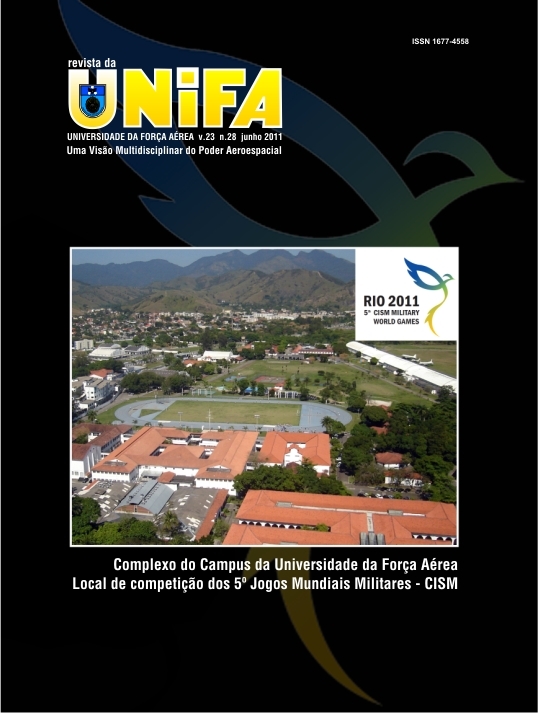Impact of the MM5 Planetary Boundary Layer Parameterizations on Wind Forecast at Low Levels
DOI:
https://doi.org/10.22480/revunifa.2011.23.642Keywords:
MM5, Parameterization, Planetary boundary layer, WindAbstract
The numerical forecast model MM5 is composed of basic equations of atmospheric motion and parameterizations. One of these is the planetary boundary layer (PBL), where there are major phenomena that interfere with human activity, such as fog, whose prediction depends on analysis of several factors, including wind. This research aimed to quantify the influence of PBL parameterizations on wind forecast at low levels of MM5 model applied to Porto Alegre, facing stable atmospheric conditions. Concerning to its purposes, this research is classified as descriptive. Concerning to its object, this research is classified as experimental so as five typical consecutive foggy days were selected. The period was characterized by the presence of a stable layer at low levels. The following parameterization schemes were evaluated: Blackadar, Burk-Thompson, MY2.5, Hong-Pan, and Gayno-Seaman. The model was run with a different scheme for each day. The predictions were correlated with those observations obtained from SBPA radiosonde of 12 UTC. The Hong-Pan and Blackadar parameterization were the ones that influenced the MM5 to produce the results of wind magnitude closer to observational data. As to wind direction, most of the
schemes obtained good results, except for Burk-Thompson, which diverged from 300 m on. In conclusion, both the Hong-Pan and the Blackadar parameterizations can be used in the prediction model MM5, especially when the atmosphere is stable at low levels.
References
ARYA, S. P. S. Suggested revisions to certain boundary layer parameterization schemes used in atmospheric circulation models. Monthly Weather Review, [S.l.], v. 105, issue 2, p. 215-227, feb. 1977.
BRAUN, S. A.; TAO; W. Sensitivity of High-Resolution Simulations of Hurricane Bob (1991) to Planetary Boundary Layer Parameterizations. Monthly Weather Review, v. 128, issue 12, p. 3941–3961, dec. 2000.
BRIGHT, D. R.; MULLEN, S. L. The Sensitivity of the numerical simulation of the southwest monsoon boundary layer to the choice of PBL turbulence parameterization in MM5. Weather and Forecasting, [S.l.], v. 17, issue 1, p. 99-114, feb. 2002.
CHEN, C. et al. Using MM5 to hindcast the ocean surface forcing fields over the gulf of maine and georges bank region. J. Atmos. Oceanic Technol., [S.l.], v. 22, issue 2, p. 131-145, feb. 2005.
DURANTE, F.; de PAUS, T. A comparison of MM5 and meteo mast wind profiles at Cabauw, the Netherlands and Wilhelmshaven, Germany. e WindEng Journal, [S.l.], 2006. Disponível em: <http://ejournal.windeng.net/13/>. Acesso em: 10 set. 2010.
GULTEPE, I. Fog and boundary layer clouds: fog visibility and forecasting. Pure and Applied Geophysics, [S.l.], v. 164, n. 6-7, 2007.
HOLTSLAG, A. A. M.; BOVILLE, B. A. Local Versus Nonlocal Boundary-Layer Diffusion in a Global Climate Model. Journal of Climate, [S.l.], v. 6, issue 10, p. 1825-1842, oct. 1993.
LEE, S-M.; FERNANDO, H. J. S. Planetary boundary layer structure of the paso del norte airshed: a numerical study. The U.S.-Mexican border environment:Air Quality Issues along the U.S.-Mexican Border, [S.l.], n. 6, p. 59-80, 2003. Disponível em: <http://www.scerp.org/pubs/m6c2.pdf>. Acesso em: 27 set. 2010.
STEENEVELD, et al. Mesoscale model intercomparison and observational evaluation for three contrasting diurnal cycles in CASES99: focus on the stable boundary layer. In: 17th Symposium on Boundary Layers and Turbulence, San Diego, CA, may 2006 Anais eletrônicos... San Diego, CA, may 2006. Disponível em: . Acesso em: 19 set. 2010.
THOMSEN, G. L.; SMITH, R. K. The importance of the boundary layer parameterization in the prediction of lowlevel convergence lines. Monthly Weather Review, [S.l.], v. 136, issue 6, p. 2173–2185, June 2008. Disponível em: <http://dx.doi.org/10.1175/2007MWR2190.1>. Acesso em: 25 set. 2010.
UCAR. MM5 Tutorial. Disponível em: <http://www.mmm.ucar.edu/mm5/documents/tutorial-v3-notes.html>. Acesso em: 08 ago. 2010.
VERGARA, S. C. Projetos e relatórios de pesquisa em administração. 10. ed. São Paulo: Atlas, 2009.
ZHANG, D.; ZHENG, W. Diurnal cycles of surface winds and temperatures as simulated by five boundary layer parameterizations. Journal of Applied Meteorology, [S.l.], v. 43, issue 1, p.157-169, Jan. 2004.
Downloads
Published
Issue
Section
License
Copyright (c) 2011 Gerson Luiz Camillo

This work is licensed under a Creative Commons Attribution-NonCommercial 4.0 International License.
Revista da UNIFA permite que o (s) autor (es) mantenha(m) seus direitos autorais sem restrições. Atribuição-NãoComercial 4.0 Internacional (CC BY-NC 4.0) - Revista da UNIFA é regida pela licença CC-BY-NC









